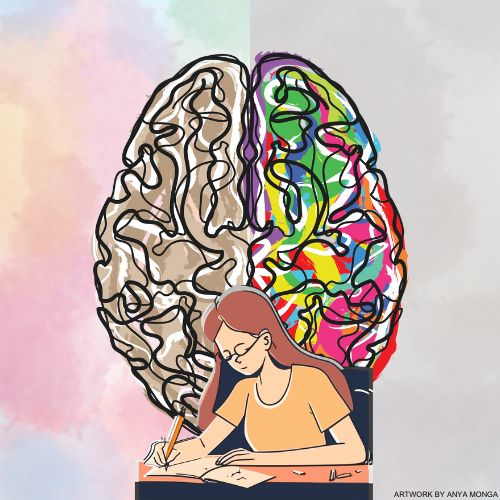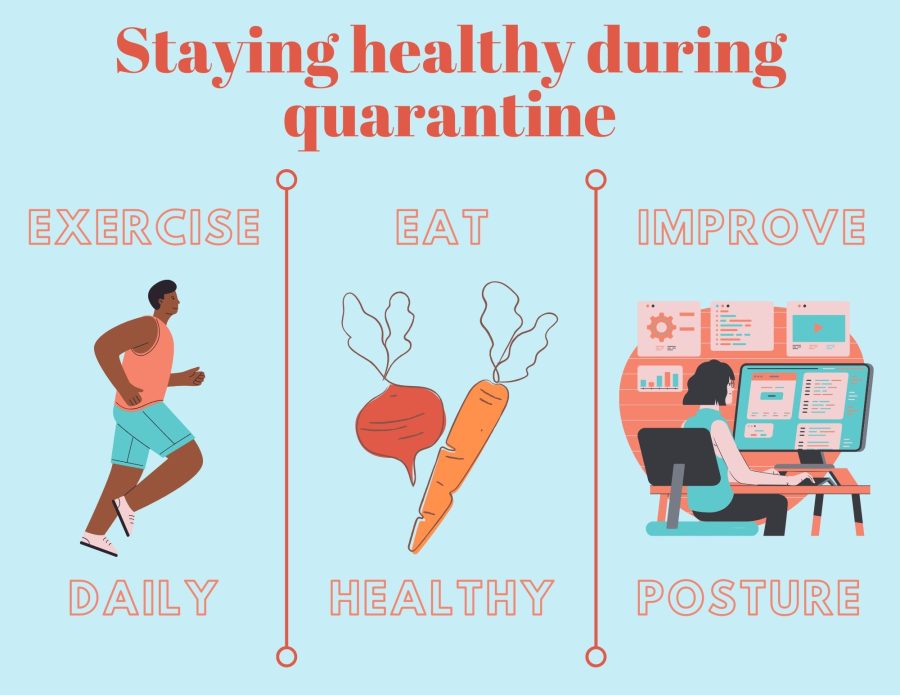Ever since shelter-in-place started due to the COVID-19 pandemic, students have had to stay home for nearly three months. Although spending every day at home can have its perks, it’s also important to look after one’s health during this time.
Exercise
This point may be obvious, but it can be difficult to remember to exercise when ordered to stay at home. However, there are many ways to work out at home. For example, there are many videos on YouTube specifically for working out at home in a small space with no equipment. Also, for those with stairs, running up and down them can be a quick exercise to replace jogging outdoors.
Despite being confined indoors, it is important to exercise regularly. According to cdc.gov, the Centers for Disease and Control Prevention website, regular physical activity helps adolescents “build strong bones and muscles, control weight, reduce symptoms of anxiety and depression, and reduce the risk of developing health conditions.” In addition, students who are more active tend to have improved cognitive function and better grades.
Too much inactivity can lead to increased risk of developing health conditions such as obesity, cardiovascular disease or diabetes. It also can lead to decreased bone density which may lead to osteoporosis.
Eating Healthy
Although it can be tempting to snack on junk food during quarantine, it’s important to be maintaining a healthy diet. According to healthline.com, eating healthy will lower chances of getting heart disease and cancer, improve brain function and help with physical performance.
Balanced meals should include vegetables, protein and fruit. Eating too many refined sugars, refined carbs and unhealthy fats can be linked with health problems.
According to hhs.gov, the U.S. Department for Health and Human Services website, some tips on how to eat healthy are to make half the plate consist of fruits and veggies. Choosing a wide variety of colorful vegetables like tomatoes, broccoli and sweet potatoes makes it easier to get the right vitamins and minerals.
Also, it’s important to remember to drink enough water every day. According to eatright.org, 14-18-year-old girls should drink 10 cups of water a day while boys in that age range should be drinking 14 cups a day. This amount may change depending on climate and activity level.
Posture
Staying at home and having school online means spending much more time sitting down at a computer or laptop. However, according to thephysiocompany.com, good posture is important for long-term health.
Although it’s less obvious than having a healthy diet and exercising daily, having good posture is just as essential. Good posture means keeping your bones aligned well with your body while properly distributing tension to muscles and ligaments. This allows muscles to coordinate more efficiently, reduces the risk of spinal injury and decreases chronic risks like arthritis.
In addition, according to the study “Upright Posture Improves Affect and Fatigue in People With Depressive Symptoms” on pubmed.ncbi.nlm.nih.gov, having an upright posture may “increase positive affect, reduce fatigue, and decrease self-focus in people with mild-to-moderate depression.”
When sitting at a desk behind a computer, many factors should be taken into account when considering posture. According to nhs.uk, wrists should be straight, with hands at or slightly below elbow level. The computer or laptop should be an arm’s length away, and knees should be at or slightly below hip level. The chair should be adjusted to support the lower back and reduce strain. Feet should be placed flat on the ground or on a footstool if that’s more comfortable. Crossing your legs is not recommended, as this may negatively affect posture.


























